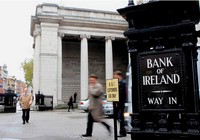It is understandable how behind the alarms of markets and stock exchanges there is an invitation, maybe even a cry, for a serious change in lifestyle
By Luigino Bruni
Published on: Cittanuova.it on 23/11/2010
 The financial crisis in Ireland, following that of Greece, does nothing but remind us that the West has gone too far into debt. The rescue of many banks and businesses last year, following the crisis, led especially to a shift of debt from the private to the public sector.
The financial crisis in Ireland, following that of Greece, does nothing but remind us that the West has gone too far into debt. The rescue of many banks and businesses last year, following the crisis, led especially to a shift of debt from the private to the public sector.
While large economies are still able to manage enormous public debts (until when?), speculative finance is signaling a very serious problem when it attacks smaller and more fragile States. There is too much debt going around, because in the last 40 years we have consumed more than our income. Why?
The question of demographics is certainly a big one. In the West, the average life span has increased by nearly 20 years over the last few decades, and at the same time people are having fewer children. A new social pact between generations must be found because the traditional "social state" model that arose after World War II can no longer work (a decreasing number of youth must finance the pensions of a growing number of elderly). But, as the Pope reminded us, there is an urgent need of a change in the model of development and lifestyle, which involves all of us together and each one individually.
I'll limit myself to just a few questions: when will we see thousands among millions of the world's professors spend a semester in fragile African universities? When will we see substantial investments in renewable energy? When will public administrations buy only ecological, low-powered cars? When will businesses and governments invest 20 to 30 percent of their gross product to cooperate in development, providing funds for education, hospitals, advanced and clean technology, efficient transportation and dignified living spaces?
If we do not begin to answer these questions in our daily lives, the economic and social scenario in the next few decades will undoubtedly be other new global crises. One can then understand how underneath the alarms of markets and stock exchanges there is something much more important: an invitation, maybe a cry, that calls for a change in lifestyle, towards an economy that is finally one of communion.







